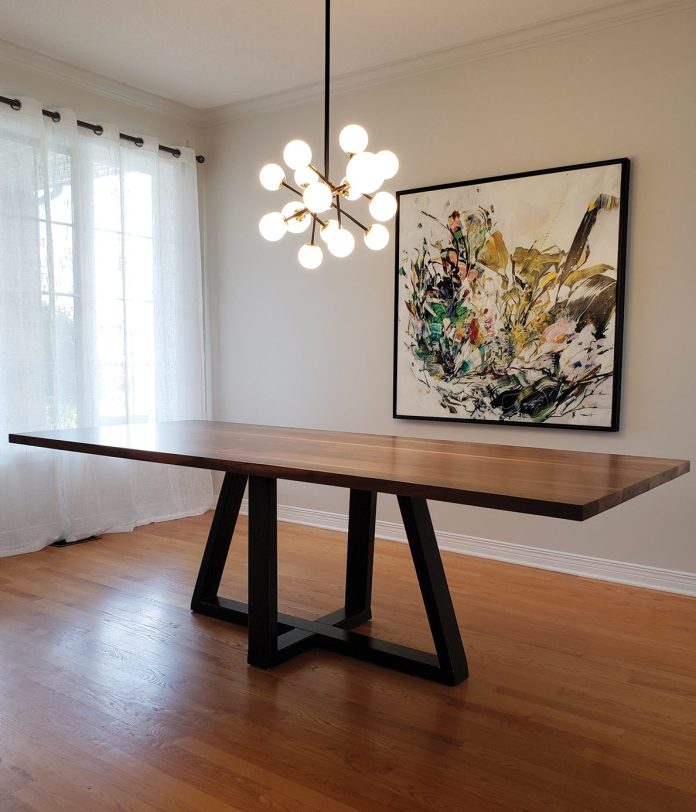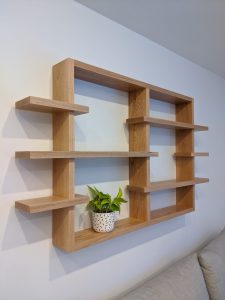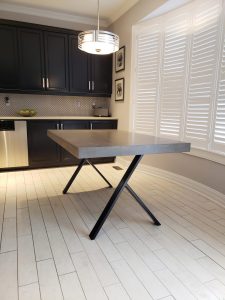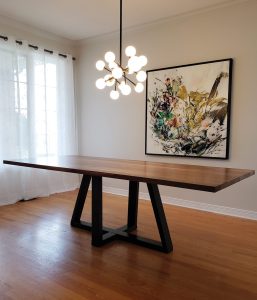By Maureen McEwan
You’ve likely heard some of the arguments for buying custom-made furniture — it’s environmentally friendly, it’s locally-produced, it’s long-lasting, etc. Custom-made furniture has been an ongoing trend and, with more people working remotely, the home environment is in sharper focus this year.
We wanted to know what all the custom furniture fuss was about so we spoke with a local authority on the subject: Gareth Davies, founder and owner of Maker House Co.
According to Davies, there are two main draws to custom-made furniture: The process and the quality.
“It checks a few boxes and needs that they just can’t meet at a big box store,” he said. “For example, they (customers) get to be involved in the process from the start when they walk in our store.”
If customers go to Maker House, they are usually looking for something to suit the unique needs and dimensions of their space.
Davies said that the process begins with listening to the customers and understanding their design vision. Next, the Maker House team shows them samples of different woods, styles of furniture and specific details so that their team can match their idea for the custom-made piece as closely as possible.
“They really do get to be involved with the design and planning process,” he said.
Shortly after, customers receive a quote and the project begins, if all is approved. From here, Davies said that they can visit the workshop during production — customers can see which wood is being used and they often approve the layout of the boards — adding a high level of engagement with the woodshop staff.
“The quality of the piece[s] is another big draw for buying local and Canadian-made because they see that process, they have every confidence in the quality of the workmanship.”
Often, those who are drawn to custom furniture are “IKEA graduates,” as Davies describes them. They are people who are hoping to upgrade from their “more temporary pieces.”
It is a stage of life we can all relate to, he added, and pieces of furniture from larger stores or chains come in and out of your life (and home!). But for the “bigger investments,” that’s where higher quality custom furniture comes in.
“We call them ‘heirlooms of the future,’” Davies said. “The hope is that these pieces will outlast the customer in many ways. They can pass [them] on to their children. And I know, personally, one of the draws for me, in starting a business like Maker House, was an appreciation of the heirlooms that have been passed down to me.”
Maker House was established in 2015 but the company’s story dates back generations. Lorne Casey, Davies’ grandfather, is featured on the company website: He was described as “a craftsman, furniture refinisher, and an international furniture buyer for a Toronto department store.”
“They are still my favourite pieces of furniture, that my grandfather would have built or refinished,” Davies added. “So we’re trying to bring that back a little bit.”
The idea of creating ‘heirlooms’ is something that they live by as a team at Maker House — Davies said it is part of their legacy.
“It’s a big reason why we love doing what we do because we’re creating functional artwork that will be around [for] a long time, it’s something that the customer can appreciate for the rest of their life. We call it ‘forever furniture.’
Even with the pandemic, trends in furniture and decor have emerged. With more people at home, Davies said they’ve noticed “an uptick” in demand for custom-made organizational pieces like shelves and storage cubbies.
“I think another trend we’ve seen a little bit is investing in a home office, like getting a nice work-from-home desk,” he added. “That accelerated this year due to COVID-[19], of course.”
Recently, Maker House has created a prototype for a Murphy desk. Their staff is looking at ways to create more furniture options for people with smaller spaces — like desks, coffee tables and kitchen islands — especially during the “condo boom” that is happening in Ottawa, he added.
As with any year, their usual demand for dining tables has been consistent.
“On the dining table side, I think each year what we’ve seen is people just constantly looking for something different, something that they haven’t seen before, or they certainly haven’t seen in Ottawa or in other stores,” Davies said.
Geometric metal bases have been trendy in custom-made tables. Over the last four or five years, Maker House has carried a style called “Chevron Legs.” The metal base gives people more space on the ends, has a symmetric, geometric look and has proven to be continually popular.
Other metal bases they make include Gaspipe Legs, Tripod Pedestal, Y-Legs and others. Davies said the Y-Legs look high-end yet they are affordable, so they remain in demand.
“Those have been popular because you wouldn’t see them in any other store and [they] have a kind of zero gravity effect where you are looking at the table wondering, ‘how this leg is holding up this table?’” he added. “So that’s kind of fun.”
For materials, one of the top trends he’s seen this year is in wood grains.
“I would say the main trend in table tops has been more people interested in kind of a wilder grain variation, so different colour contrasts throughout the table,” Davies said.
Maker House has created pieces with different shades of walnut (the darker brown wood and lighter sapwood), the varying colours of ambrosia maple (light base, dark striations) and furniture with a distinct “striped pattern” where the wood colours alternate from dark to light.
Right now, their more popular types of wood are those hardwoods — walnut, ambrosia maple and cherry — as well as distressed pine, the “workhorse” softwood. Davies said most of the company’s material is sourced in Canada.
“The material that we use generally comes [from] local as well, sourced domestically,” he said. “We generally don’t use exotic, imported woods. Even the steel that is used in our table bases is Canadian steel.”
“We do our best to source everything possible in Canada,” he added.
Maker House Co. is located at 987 Wellington St. W. in Hintonburg. To learn more about their custom furniture, visit makerhouse.com.
This story appeared in the fall edition of Homes & Condos.



